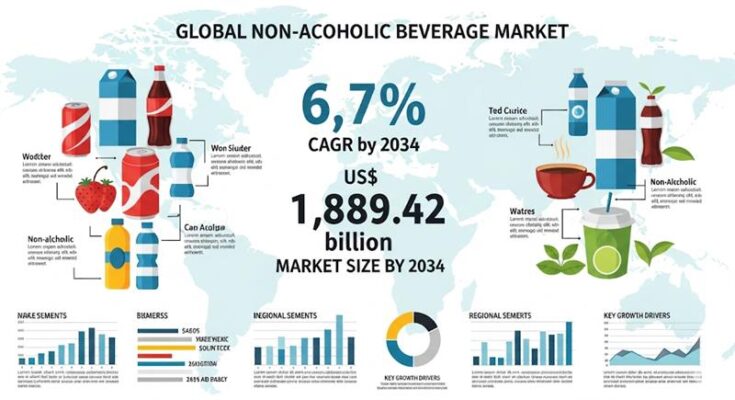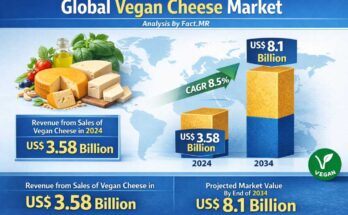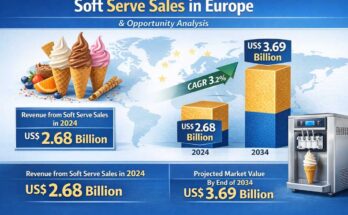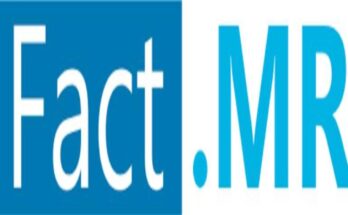The global non-alcoholic beverage market is undergoing a transformative phase as shifting consumer preferences, health consciousness, and innovative product offerings continue to reshape the industry landscape. According to recent insights, the market is estimated to account for a revenue value of US$ 987.3 billion in 2024 and is projected to reach US$ 1,889.42 billion by the end of 2034, with a steady compound annual growth rate (CAGR) of 6.7% over the next decade. This rapid expansion highlights the growing importance of beverages that cater to diverse consumer needs without relying on alcohol.
From traditional categories such as juices and carbonated drinks to emerging segments like functional beverages, plant-based drinks, and energy boosters, the industry is thriving on innovation and sustainability. This article explores the dynamics, drivers, trends, opportunities, challenges, and regional outlook shaping the global non-alcoholic beverage market between 2024 and 2034.
Market Overview
The non-alcoholic beverage market includes a wide range of drinks such as carbonated soft drinks, juices, bottled water, functional beverages, ready-to-drink teas and coffees, dairy alternatives, energy drinks, and sports beverages. Over the years, this sector has evolved beyond refreshment, offering products that focus on health, wellness, sustainability, and convenience.
Factors such as rising disposable incomes, urbanization, changing dietary habits, and increased focus on preventive health are fueling demand. Moreover, the growing penetration of e-commerce platforms and retail innovations are enhancing accessibility and consumer engagement.
Key Market Drivers
- Rising Health Consciousness: One of the primary growth drivers of the non-alcoholic beverage industry is the increasing emphasis on health and wellness. Consumers are moving away from high-sugar drinks and artificial ingredients, opting instead for beverages enriched with natural flavors, vitamins, minerals, and functional ingredients.
- Shift Toward Functional Beverages: Functional drinks, including sports drinks, probiotic beverages, immunity boosters, and plant-based protein drinks, are gaining popularity. The growing interest in holistic wellness and active lifestyles has made functional beverages a fast-expanding segment.
- Sustainability and Ethical Consumerism: Eco-conscious consumers are influencing brands to adopt sustainable packaging, ethical sourcing, and clean-label products. The focus on reducing carbon footprints and plastic waste is creating opportunities for innovations in biodegradable packaging and refillable solutions.
- Expansion of Distribution Channels: E-commerce and direct-to-consumer platforms have revolutionized beverage sales. Consumers now expect convenience, quick delivery, and personalized options, making digital channels a crucial part of market growth.
- Cultural Shifts and Lifestyle Choices: The younger generation is increasingly choosing non-alcoholic options in social and professional settings. This cultural shift is driving demand for premium non-alcoholic alternatives such as mocktails, craft sodas, and alcohol-free spirits.
Market Trends
- Plant-based and Dairy Alternatives
The rise of plant-based beverages, including almond milk, oat milk, soy drinks, and coconut water, is reshaping the dairy alternatives sector. These beverages are appealing to vegans, lactose-intolerant individuals, and health-focused consumers.
- Premiumization of Non-Alcoholic Beverages
Consumers are willing to pay a premium for high-quality, organic, and ethically sourced products. Craft sodas, artisanal teas, and alcohol-free wines and beers are becoming mainstream, offering sophisticated alternatives to alcoholic beverages.
- Low- and No-sugar Options
With increasing awareness of obesity and diabetes, there is a growing demand for beverages with reduced sugar content or natural sweeteners like stevia, monk fruit, and agave.
- Personalized Nutrition
Technological innovations are enabling brands to offer customized beverages tailored to individual dietary needs, fitness goals, and health conditions. This trend is likely to dominate the next decade.
- Functional Ingredients
Ingredients such as probiotics, adaptogens, collagen, CBD, and nootropics are being infused into drinks to target specific health benefits ranging from gut health to stress relief.
- Ready-to-drink Innovations
Convenience remains a significant demand driver. Ready-to-drink teas, coffees, and energy shots are witnessing substantial growth as consumers prioritize on-the-go lifestyles.
Challenges Facing the Market
Regulatory Compliance: The non-alcoholic beverage sector faces stringent regulations regarding health claims, labeling, and ingredient approvals. Adhering to these standards without compromising innovation remains a challenge.
Competition and Market Saturation: The presence of global giants alongside regional players creates a highly competitive environment. Differentiation through branding, product innovation, and sustainability is essential for survival.
Supply Chain Disruptions: Volatility in raw material prices, supply chain bottlenecks, and climate-related issues impact production costs and availability of natural ingredients.
Consumer Skepticism: While demand for functional beverages is increasing, consumers remain skeptical about exaggerated health claims. Building trust through transparency and scientific validation is crucial.
Applications & End-use Outlook
- Foodservice Industry: Restaurants, cafés, and quick-service outlets are expanding their non-alcoholic offerings to cater to the growing demand for alcohol-free choices. Signature mocktails, cold-brew coffees, and flavored waters are becoming menu staples.
- Retail and E-commerce: Supermarkets, hypermarkets, and online platforms continue to dominate beverage distribution. Subscription-based models and direct-to-consumer approaches are reshaping purchasing patterns.
- Healthcare and Fitness: The fitness industry has embraced functional and energy drinks, while healthcare institutions are promoting natural juices and fortified beverages as part of wellness programs.
- Corporate and Social Settings: Corporate events and social gatherings are increasingly offering non-alcoholic options to promote inclusivity and cater to diverse preferences.
Regional Insights
- North America remains a dominant market, driven by demand for health-conscious products, plant-based beverages, and premium non-alcoholic alternatives. Innovation and strong retail presence fuel growth in the region.
- Europe is experiencing significant demand for sustainable and organic non-alcoholic beverages. Stringent regulations and consumer preference for clean-label products are shaping market offerings.
- Asia-Pacific is emerging as a high-growth region, fueled by rising disposable incomes, urbanization, and a youthful demographic open to new beverage trends. Countries like China, India, and Japan are central to this expansion.
- The region is witnessing growing interest in natural juices, energy drinks, and flavored waters, supported by rising health awareness and a strong café culture.
- Cultural and religious factors in this region encourage non-alcoholic consumption, particularly for premium juices, flavored waters, and alcohol-free beer alternatives.
Competitive Landscape
The non-alcoholic beverage industry is highly competitive, with multinational corporations and local brands striving for market share. Key players are focusing on:
- Expanding product portfolios with plant-based and functional options.
- Collaborating with e-commerce platforms for direct consumer engagement.
- Investing in eco-friendly packaging solutions.
- Launching premium and niche products to appeal to younger demographics.
Innovation, branding, and sustainability will remain the cornerstones of competitive strategies over the next decade.
Future Outlook
The global non-alcoholic beverage market is poised for robust growth through 2034, fueled by health-conscious lifestyles, sustainable practices, and rapid digital adoption. With consumers demanding healthier, more transparent, and personalized options, the industry is expected to witness a surge in innovation and diversification.
Brands that focus on aligning with consumer values—sustainability, wellness, and convenience—are likely to thrive. Moreover, collaborations between technology, food science, and retail will define the future of the non-alcoholic beverage sector.
Conclusion
The non-alcoholic beverage market is not just about refreshment; it represents a movement toward healthier, more sustainable, and inclusive choices. With strong growth projections and increasing consumer engagement, the sector is set to redefine the global beverage industry in the coming decade. Companies that invest in innovation, transparency, and ethical practices will lead this transformation, creating lasting value for both businesses and consumers.



